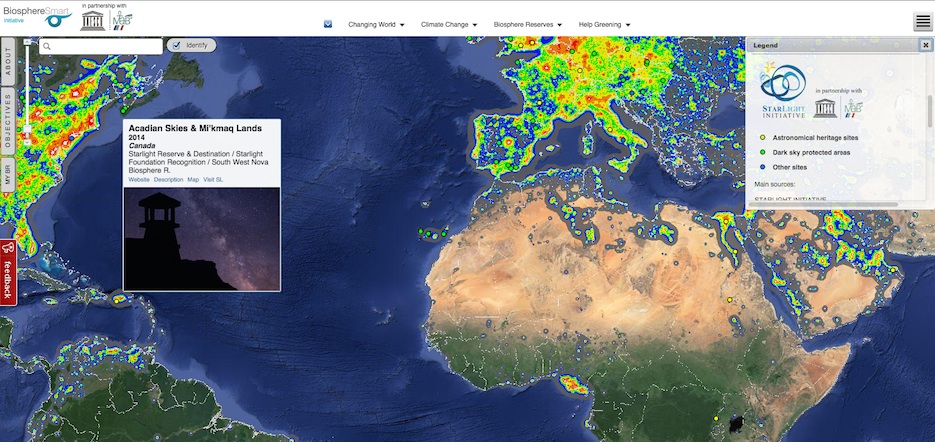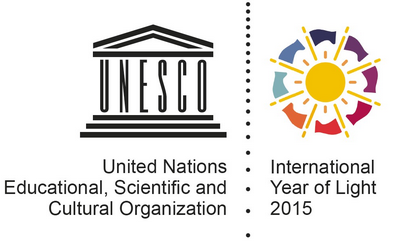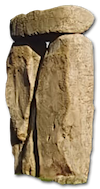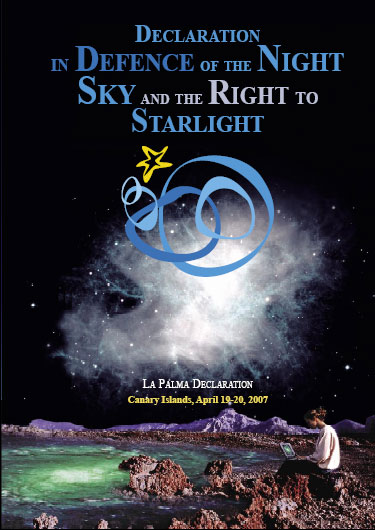Benchmark sites - GIS web map launched on occasion of IYL2015


Interactive web map provided by BiophereSmart Initiative in partnership with UNESCO's Man and the Biosphere Programme (MAB), and supported by the Starlight Initiative and by INTERRA. This initiative is launched on the occasion of the International Year of Light and Light-based Technologies (IYL2015), under the slogan "There is another way to light up the night".
The Benchmark sites window hosted in BiospherSmart platform allows access with one click to all the information of the most relevant astronomical heritage sites, dark sky protected areas and other places committed to the preservation of the values associated with the night sky. It also includes information about the success stories that have adopted more intelligent lighting systems which reduce light pollution. Over twenty biosphere reserves and several world heritage sites have received awards and recognition for the quality of the night skies and light pollution control.
BiosphereSmart is a global observatory created to share ideas, knowledge, good practices, and experiences among Biosphere Reserves and UNESCO sites on issues related to climate change, green economies, and sustainable development.
![]() Access to Benchmark Sites interactive map
Access to Benchmark Sites interactive map
Main sources and collaborating projects
THE PORTAL TO THE HERITAGE OF ASTRONOMY
Integrated web portal for UNESCO’s Astronomy and World Heritage Initiative, supported by the International Working Group on Astronomy and World Heritage and by the International Astronomical Union through its Astronomy and World Heritage Working Group.
The Portal to the Heritage of Astronomy is a dynamic, publicly accessible database, discussion forum, and document-repository on astronomical heritage sites throughout the world, whether or not they are on UNESCO’s World Heritage List or national Tentative Lists. Serving UNESCO’s Astronomy and World Heritage Initiative, it suggests tools for the definition, identification, and assessment of the significance and, potentially, Outstanding Universal Value of this type of heritage. It also gives examples of the identification of such heritage together with information relevant to its protection, conservation, management and promotion.
![]() The Portal to Heritage of Astronomy
The Portal to Heritage of Astronomy
![]() Astronomical Heritage Finder
Astronomical Heritage Finder
WORLD LIST OF DARK SKY PROTECTED AREAS - IUCN Dark Skies Advisory Group (DSAG)
Established in 2009, the Group provides advice and guidance on behalf of the International Union for Conservation of Nature (IUCN) to other bodies in regards to light pollution and dark sky values, in particular as they relate to the ecological and commemorative integrity, visitor appreciation and public understanding of protected areas, and the long term maintenance of dark sky values for future generations.
![]() The web site of the IUCN Dark Skies Advisory Group
The web site of the IUCN Dark Skies Advisory Group
![]() World List of Dark Sky Protected Areas
World List of Dark Sky Protected Areas
STARPARKS - One Star at a Time Initiative
The "One Star at a Time" program is a worldwide effort to create accessible public spaces to view a starry night sky. A StarPark is a window to the firmament that each community voluntarily designates to enjoy the starry night sky. Its function is to claim and secure the right to starlight, especially for future generations..
![]() Global Starpark Network
Global Starpark Network
BIOSPHERESMART INITIATIVE
Biosphere Smart is a global observatory created to share ideas, knowledge, best-practices, and experiences among Biosphere Reserves on issues related to climate change, green economies, and sustainable development. The BiosphereSmart Initiative is based on the idea to maximise the use of new information technologies to build a covenant for a sustainable future and a transition to green societies based on knowledge. The BiosphereSmart platform is managed and operated by INTERRA.
![]() The BiosphereSmart Initiative
The BiosphereSmart Initiative
![]() BiosphereSmart Portal
BiosphereSmart Portal
There is another way to light up the night
"The intelligent use of artificial lighting that minimises sky glow and avoids obtrusive visual impact on both humans and wildlife has to be promoted. Public administrations, the lighting industry, and decisionmakers should also ensure that all users of artificial light do so responsibly as part of an integral part of planning and energy sustainability policies, which should be supported by light pollution measuring, both from the ground and from space. This strategy would involve a more efficient use of energy so as to meet the wider commitments made on climate change, and for the protection of the environment". Point 7 of DECLARATION IN DEFENCE OF THE NIGHT SKY AND THE RIGHT TO STARLIGHT (La Palma, 2007). Download
LOOKING FOR SOMETHING?


Starlight Initiative collaborates with the
PORTAL TO THE HERITAGE OF ASTRONOMYUpdates
- New Brochure of UNESCO`s MAB Programme partnership
- Galicia adopts the Starlight Declaration
- Starlight at the 39th session of the World Heritage Committee
- International declaration warning about the effects of blue-rich white light
- Flyer - Starlight Initiative in partnership with the UNESCO MAB Programme
- Astronomical Heritage - Hawaii 2015
- 2015 International Year of Light
- Montsec - Starlight Destination and Reserve
Starlight Finder
Starlight related links
![]()
Covenant of Mayors Related Initiative
![]()
Colaborating with IAU Working Group
![]()
IUCN Dark Sky Advisory Group
![]()
Dark Skies Awareness Project
![]()
Partnership Unesco-MaB
![]()
Member of the Knowledge Network
![]()
Instituto de Astrofísica de Canarias
|
The Starlight Initiative is designed as an international action in defence of the values associated with the night sky and the general right to observe the stars. It is open to the participation of all scientific, cultural, environmental, and citizens' organizations... |
In partnership with: |
|
|
|


